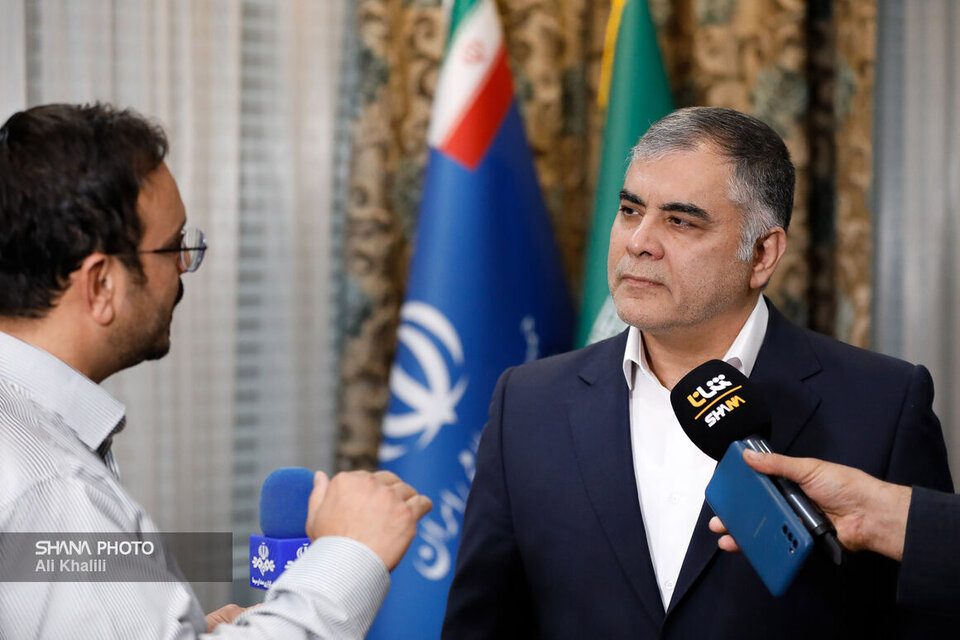Mohsen Paknejad told Shana that despite significant restrictions over the past year, Iran has at times set records in crude oil production and exports. “I am sharing these figures so our people know their sons in the oil industry are working hard despite the challenges and sanctions,” he said.
Addressing public concerns over the snapback mechanism’s potential impact on oil exports, Paknejad noted that since the enactment of the “SHIP Act” last June, Iran has faced severe restrictions but managed to bypass them through “necessary measures.” He said the possible enforcement of snapback sanctions would not impose tougher conditions than before, though some complications might arise. “People should not be worried; with God’s help, oil exports are proceeding successfully,” he said.
Following the Leader’s guidance on advancing energy technologies
Paknejad said a working group of university professors, industry experts, and energy specialists has been formed to enhance oil and gas production technologies in line with the Supreme Leader’s directives.
The minister said the group has already held two sessions and is focusing on modern technologies for oil and gas field development and improving recovery rates. “Iran’s oil and gas fields have significant potential to increase recovery rates,” he said, adding that domestic capabilities exist to adopt advanced technologies and the group’s findings will be shared with the public.
Paznan field development to strengthen energy supply
Discussing the Paznan field’s role in reducing energy imbalance, particularly in winter, Paknejad said new studies estimate an additional 10 trillion cubic feet of gas reserves. After development, the field is expected to produce over 20 million cubic meters of gas per day.
“This is a significant amount that will help balance supply during peak winter demand, when gas must be prioritized for households and commercial users,” he said. The project’s investment comes from a major petrochemical holding, which will use part of the gas for its own operations and supply the rest to the national network.
Full presidential support for flare gas recovery projects
Paknejad said the government has short- and long-term plans to reduce flare gas burning. In the short term, private firms will be allowed to participate in flare gas recovery projects “even with a base price of zero,” turning captured gas into high-value products.
He noted that long-term plans include NGL projects, one of which was inaugurated last month in the presence of the president. “By the end of the Seventh Development Plan, most associated gas will be recovered,” he said.
Flare gas, he emphasized, is a valuable national resource that must not be wasted. “We will do everything possible to collect and utilize this gas in the shortest possible time,” he said, adding that the president has pledged full support to accelerate these efforts.
Fuel reserves up 127% for power plants
Paknejad said liquid fuel reserves for power plants have increased 127% compared to the same period last year, thanks to efforts by the National Iranian Oil Refining and Distribution Company and fuel import teams.
“This growth means that in winter, when natural gas must be prioritized for residential use, we can replace it with diesel and avoid power outages,” he said.
He added that gasoline consumption hit record highs this summer and urged citizens to help manage demand through efficiency and conservation.
Smart energy management projects underway
The minister said the Ministry of Petroleum is implementing Article 44 of the Seventh Development Plan through the launch of a comprehensive smart energy management system. The ministry’s Hydrocarbon Resources Supervision Department, which also oversees exports, is coordinating smart energy measurement and monitoring projects to meet quantitative targets of the plan.
Diesel imports halted as smuggling, consumption decline
Paknejad said domestic production growth, fuel demand management, and reduced smuggling helped lower diesel consumption by up to 5 million liters per day over the past year, eliminating the need for imports.
“Reducing crude sales and turning oil into higher value-added products has long been our goal,” he said. “With improved refinery operations, we have increased diesel output and no longer face the heavy import levels seen last year.”


Your Comment